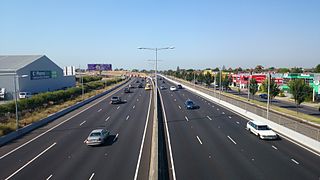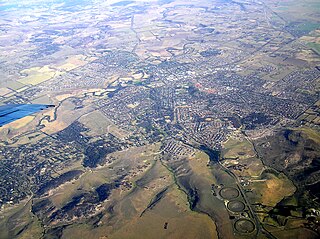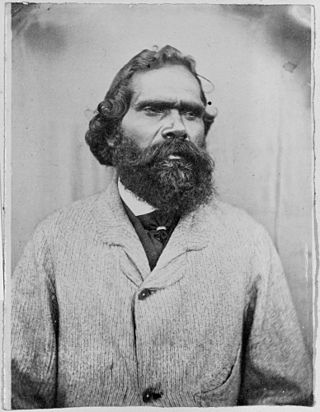
The Eureka Rebellion was a series of events involving gold miners who revolted against the British administration of the colony of Victoria, Australia during the Victorian gold rush. It culminated in the Battle of the Eureka Stockade, which took place on 3 December 1854 at Ballarat between the rebels and the colonial forces of Australia. The fighting resulted in an official total of 27 deaths and many injuries, the majority of casualties being rebels. There was a preceding period beginning in 1851 of peaceful demonstrations and civil disobedience on the Victorian goldfields. The miners had various grievances, chiefly the cost of mining permits and the officious way the system was enforced.

Sir Redmond Barry,, was a colonial judge in Victoria, Australia of Anglo-Irish origins. Barry was the inaugural Chancellor of the University of Melbourne, serving from 1853 until his death in 1880. He is arguably best known for having sentenced Ned Kelly to death.
The history of Melbourne details the city's growth from a fledgling settlement into a modern commercial and financial centre as Australia's second largest city, Melbourne, in the state of Victoria.

Tullamarine is a suburb in Melbourne, Victoria, Australia, 14 km (8.7 mi) north-west of Melbourne's Central Business District, located within the Cities of Brimbank, Hume and Merri-bek local government areas. Tullamarine recorded a population of 6,733 at the 2021 census.

The Wurundjeripeople are an Australian Aboriginal people of the Woiwurrung language group, in the Kulin nation. They are the traditional owners of the Birrarung Valley, covering much of the present location of Narrm (Melbourne). They continue to live in this area and throughout Australia. They were called the Yarra tribe by early European colonists.

Bulla is a locality and township in Melbourne, Victoria, Australia, 23 kilometres (14 mi) north-west of Melbourne's Central Business District, located within the City of Hume local government area. Bulla recorded a population of 668 at the 2021 census.

Sunbury is a suburb in Melbourne, Victoria, Australia, 36 kilometres (22 mi) north-west of Melbourne's Central Business District, located within the City of Hume local government area. Sunbury recorded a population of 38,851 at the 2021 census.

John Batman was an Australian grazier, entrepreneur and explorer. He is best known for his role in the founding of Melbourne.

The Moonee Ponds Creek is a creek and major tributary of the Yarra River running through urban Melbourne, Victoria, Australia from northern to inner suburbs. In 2004 a reporter for The Age described it as "arguably the most abused tributary of the Yarra River, and part of the true underside of Melbourne".

John Pascoe Fawkner was an early Australian pioneer, businessman and politician of Melbourne, Australia. In 1835 he financed a party of free settlers from Van Diemen's Land, to sail to the mainland in his ship, Enterprize. Fawkner's party sailed to Port Phillip and up the Yarra River to found a settlement which became the city of Melbourne.

William Barak, named Beruk by his parents,, the "last chief of the Yarra Yarra tribe", was the last traditional ngurungaeta (elder) of the Wurundjeri-willam clan, the pre-colonial inhabitants of present-day Melbourne, Australia. He became an influential spokesman for Aboriginal social justice and an important informant on Wurundjeri cultural lore.
The Port Phillip Association was formally formed in June 1835 to settle land in what would become Melbourne, which the association believed had been acquired by John Batman for the association from Wurundjeri elders after he had obtained their marks to a document, which came to be known as Batman's Treaty.

Simon Wonga (1824–1874), ngurungaeta and son of Billibellary, was an elder of the Wurundjeri people, who lived in the Melbourne area of Australia before European settlement. He was resolute that his people would survive the "onslaught" of white men.
The murnong or yam daisy is any of the plants Microseris walteri, Microseris lanceolata and Microseris scapigera, which are an important food source for many Aboriginal peoples in southern parts of Australia. Murnong is a Woiwurrung word for the plant, used by the Wurundjeri people and possibly other clans of the Kulin nation. They are called by a variety of names in the many different Aboriginal Australian languages, and occur in many oral traditions as part of Dreamtime stories.
Henry Edmund Pulteney Dana (1820–1852) established the Native Police Corps in the Port Phillip District in 1842, he was responsible for two massacres of Aboriginal people one at Barmah Lake in 1843 and the other at Snowy River in 1846. Dana was born in England, his father being Captain William Pulteney Dana of the 6th Regiment. Henry Dana migrated to Van Diemen's Land in 1840, but in 1842 he relocated to the Port Phillip District where he renewed acquaintance with Superintendent Charles La Trobe, whom he knew in London. The two men became firm friends and Latrobe appointed Dana to establish a native police corps.
Billibellary was a song maker and influential ngurungaeta of the Wurundjeri-willam clan during the early years of European settlement of Melbourne. He was known by various names including Billi-billeri, Billibellary, Jika Jika, Jacky Jacky and Jaga Jaga. He was an astute and diplomatic leader, described as powerfully built with an influence and reputation that extended well beyond his clan.

The Wurundjeri Woi Wurrung Cultural Heritage Aboriginal Corporation, previously the Wurundjeri Tribe Land and Compensation Cultural Heritage Council, is a Registered Aboriginal Party representing the Wurundjeri people, an Aboriginal Australian people of Victoria.
Melbourne Day is an annual celebration to mark the founding of Melbourne in Victoria, Australia, on 30 August 1835.

The Woiwurrung, also spelt Woi Wurrung, Woiwurrong, Woiworung, Wuywurung, are an Aboriginal Australian people of the Woiwurrung language group, in the Kulin alliance.
The Kurung were identified as an indigenous Australian group of the State of Victoria by Norman Tindale. The theory that they constituted an independent tribe has been challenged with modern scholarship generally considering them a clan, associated to one of two major tribes. Their language is unconfirmed.












